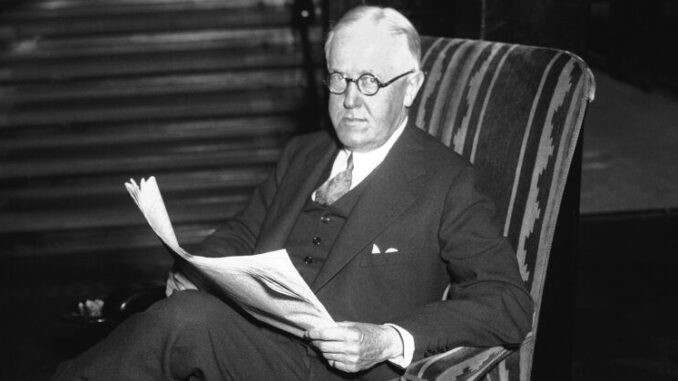A prophet without honor
Published April 11, 2024

The familiar words of Jesus, “A prophet is not without honor save in his own country,” have been applied to many political situations down through the centuries. Perhaps no such application was more apt than the admonition offered to the Democratic Party at the outset of The New Deal and sadly ignored in subsequent decades.
On the eve of the 1932 election, in a New York Times lead article, John W. Davis wrote “Why I am a Democrat.” As the Democratic presidential nominee in 1924, Davis was still a leading party figure in 1932 and had authored the 1932 party platform. In this article, Davis confidently wrote, “If the Democratic party is successful (in the 1932 election), it will balance the budget; it will lop off useless bureaus, which those who created them are naturally reluctant to destroy … and it will take the strait-jacket off the trade and commerce of the nation.” He added, “Instead of striving to give every man a share of governmental help, borrowing from impoverished Peter to pay poverty-stricken Paul, it will aim to make it possible for every man to help himself.”
Again, on March 5, 1933, the day after Franklin Roosevelt’s inauguration, Davis took to the pages of The New York Times in a lengthy feature article titled “The Torch Democracy Keeps Alight.” He declared, “Policies come and go, but principles remain” and sought to anchor the new administration to the Democratic Party’s historic principles first laid out by Thomas Jefferson. Davis reminded his fellow Democrats, “The chief aim of all government is to preserve the freedom of the citizen. His control over his person, his property, his movements, his business should be restrained only so far as the public welfare imperatively demands. The world is in more danger of being governed too much than too little.”
Davis warned the government to refrain from any activity “which private initiative is willing and able to conduct.” He then extolled the importance of local self-governance as “indispensable to liberty. A centralized and distant bureaucracy is the worst of all tyranny.”
Davis next turned to taxation and the need for government restraint. He set forth the traditional Democratic principle of taxation: “To tax one person, class, or section for the benefit of another is none the less robbery because done under the form of law and called taxation.” He exhorted the incoming administration to exercise “the courage to refuse and the willingness to forego expenditures which, even though desired by many people, are not demanded by absolute justice and necessity.”
Davis saw the undergirding principle of his party as constitutionalism. He observed, “Since men do not lose their frailties by being chosen for office, Constitutions are necessary to prevent the exercise of arbitrary power.” In the face of receiving an overwhelming electoral mandate in the 1932 election, Davis warned his fellow Democrats that “No majority, however large, and no argument, however plausible, can justify depriving a single citizen of any right guaranteed to him by the Constitution.”
Finally, Davis sought to focus his party on the “pole star by which the Democrat must steer.” All of the foregoing principles point in one direction: toward the worth and dignity of the individual. “This regard for the individual, his powers, his rights, his opportunities, lies at the very root of the Democratic creed.” Traditional Democrats should reject any notion that the state is “the distributor of special grants of money or of privilege to chosen persons or selected classes.”
The end of this story is the sad validation of Jesus’ words. Davis was indeed a prophet not without honor save in his own party. The ink was hardly dry on his March 1933 New York Times article before it became apparent that FDR had no intention of honoring the 1932 Democratic Party platform. A balanced budget, tax reduction and bureaucratic restraint were all abandoned.
As the senior partner of Davis, Polk and Wardwell, a top-drawer Wall Street law firm, Davis went on to become the “lawyer’s lawyer,” arguing more cases (141 in total) before the Supreme Court than any American except Daniel Webster. In 1936, Davis backed Alf Landon’s candidacy against FDR.
From that point on until his death in 1955, Davis never endorsed another Democrat nationally. He became the leading advocate of conservative causes before the Supreme Court and was labeled by FDR as “Public Enemy No.1.” Asked by a reporter shortly before his death if he was still a Democrat, Davis responded, “Yes. Damn still…”
Since his death, the Democratic Party has steadily moved leftward, showing no inclination to return to the Jeffersonian principles so dear to John W. Davis. His prophetic warning continues to fall on deaf ears: “The genuine Democrat is a traditional liberal, with a liberal’s outlook on life: loving freedom for freedom’s sake; believing in the wholesome virtue of self-help; hating privilege in whatever form; wishing nothing for himself from the government that his neighbor cannot enjoy; willing to think of the rights and interests of other men equally with his own…”
Sadly, his was a prophetic voice crying in the wilderness.
Garland S. Tucker III is the retired founder and CEO of Triangle Capital Corporation and author of “The High Tide of American Conservatism: Davis, Coolidge, and the 1924 Election” and “Conservative Heroes: Fourteen Leaders Who Shaped America, from Jefferson to Reagan.”







